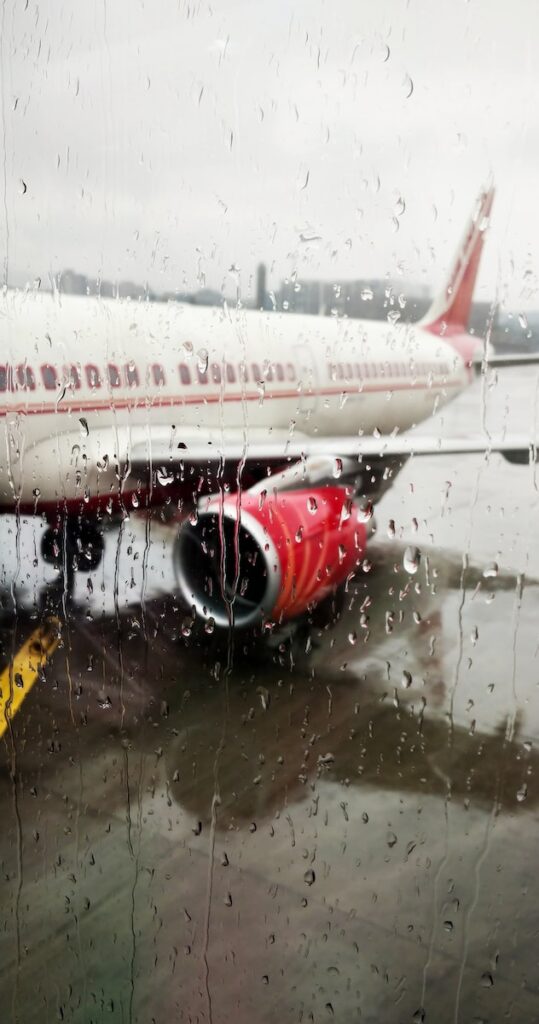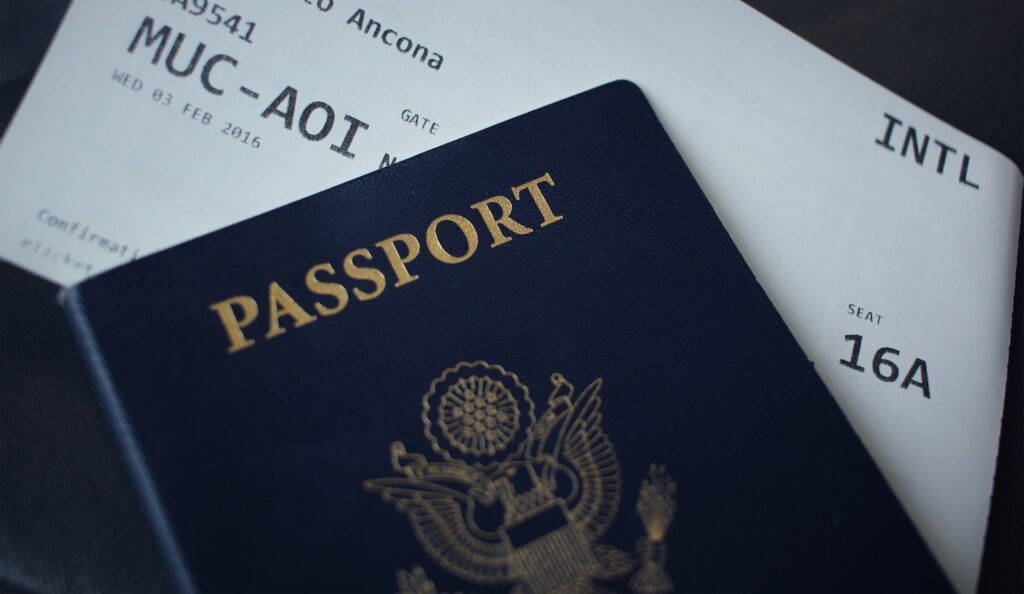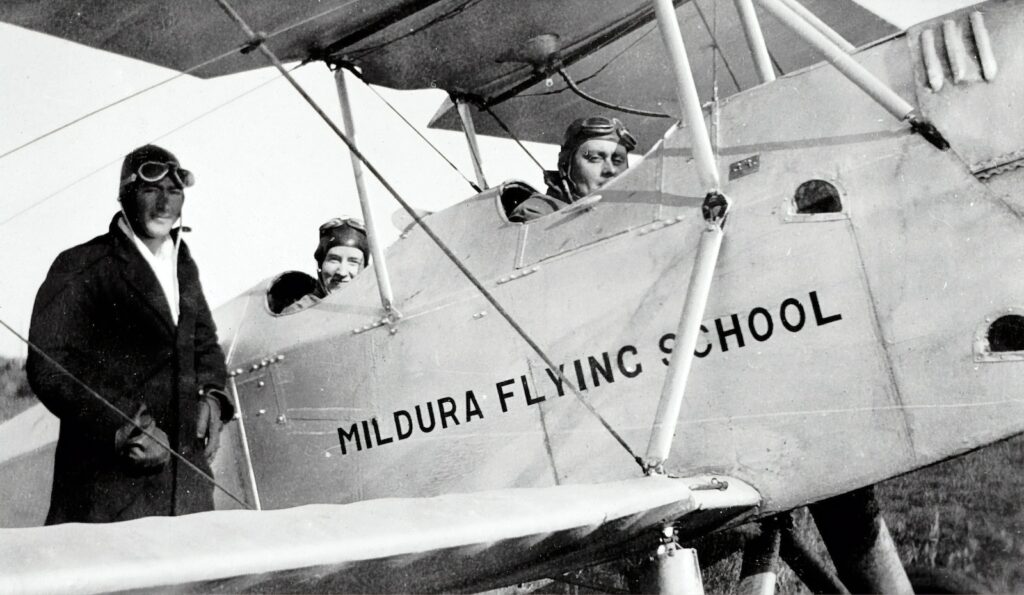If you are a nervous flyer, you might do anything to avoid getting on a plane. Unfortunately, that may mean missed opportunities, squashed dreams of traveling to distant places, and not visiting with family and friends who live far away- all because your fear of flying is holding you back.
I want you to know that it doesn’t have to be this way. You can overcome your fear of flying, and you can start doing all these things you’ve been missing out on. I overcame my fear of flying, and if I can do it, you can do it too.

My Story
I avoided flying in planes for over 30 years. I mostly just wouldn’t go anywhere far away, even though I wanted to.
But it wasn’t always this way. I’ve flown many times when I was younger, and I loved it. Then several years ago, I suddenly developed a fear that has prevented me from doing a lot of different things. That fear forced me to avoid all types of travel unless I was doing the driving myself.
When my oldest daughter got married, I turned down a free plane ticket to the wedding. For me, flying wasn’t an option. There was absolutely no way I was getting on an airplane. I ended up driving the 1000 miles in two days to get there. Flying would have been so much easier, but I just couldn’t do it at that time.
This all changed when one of my other daughters asked me to come to Alaska for her college graduation. I wanted to go, and I needed to go, but it just wasn’t practical to drive all the way to Alaska. I knew I couldn’t avoid flying any longer, and I had to find a way of overcoming flight anxiety.
I didn’t want a fear of mine to control my life and keep me from doing the things that are important to me.
With the help of a counselor, I was able to conquer my fear and fly to Alaska for the graduation. And I didn’t just get through the flight- I thoroughly enjoyed it!
Here are the steps I personally took to get over my fear of flying. These are methods that you can use too, so you can start your journey of traveling by plane. Use them as a guideline to help get you to where you want to go, which is up in the air, nervous and anxious free.

Step 1: Pray
Prayer should be your starting point in this journey. Sometimes I forget to pray first when I’m struggling through something, and I’ll wonder why it’s so hard. Then I’ll realize that I didn’t pray first.
Prayer gives me clarity and the feeling I’m not alone in whatever I’m going through. It gives me comfort knowing God is walking with me through this. Here are a few things you could pray for:
- Pray that God gives you strength to do this hard thing and enable you to face your fear and take it away.
- Pray that you are protected from every danger and kept safe throughout your travels.
- Pray to take all worries away during your trip and be able to focus on having a memorable and enjoyable time with others.
Step 2: Figure Out Your Why
Knowing why you want to get over your fear of flying will give you the motivation to actually do it. You have a fear of flying, but you probably also have something that is more important to you than that fear.
For me it was sharing an important moment in my daughter’s life, spending time with my granddaughter, and getting to travel and explore new places.
My fear of flying has been keeping me stuck for way too long. I was tired of that fear controlling me. Being fed up with something is one of the best motivators for change.
After you figure out your “why,” take it one step further. Ask yourself, “What if I don’t do that thing that is very important to me?”
I had to ask myself some important questions:
- What if I don’t share this moment with my daughter? How will she feel about that? How will I feel about that?
- What if I don’t get to see my granddaughter very often when she’s young? Am I willing to let her grow older without spending that precious time with her?
- What if I don’t get to pursue my dreams of traveling to new places? Am I okay with that?
What is it that is more important to you than your fear of flying? Write it on an index card and post it somewhere you will see every day. This will be your motivator. You could also make a vision board, with pictures and words, to use as a tool for reaching your goal and to motivate you even further.

Step 3: Know What Your Real Problem Is
Knowing what is causing you to be an anxious and nervous flyer is crucial to conquering your fear. In order to get on with your plane flight and off to your destination, you need to get to the root of your problem. Figure out what really bothers you about flying. Your answer will determine how you handle treatment for this.
Just because someone is afraid to fly, doesn’t necessarily mean they are directly afraid of the plane crashing. When I met Carolyn Hayes from North Coast Flight School in Meadville, Pennsylvania, I had just gotten back from my trip to Alaska. We started talking about why people are afraid to fly. Carolyn, whose husband, Greg Hayes, owns the flight school, says, “(For) most people that are afraid to fly, it’s lack of control, and that’s because they are completely and totally 100 percent at the mercy of that pilot. You can’t get off at the next stop like you can on a bus.”
If you think about it, most reasons for being nervous on a flight relate in some way to lack of control. Here are some common reasons you may be nervous to fly:
- Having claustrophobia.
- Being afraid of heights.
- Unsure about unfamiliar noises.
- Being afraid of turbulence.
- Fear of contracting an illness.
- Not having a clear understanding of how flight works.
- Struggle with the take-off.
- Struggle with the landing.
- Fear of bad weather during the flight.
- Fear of flying over water.
- Not having your feet firmly on a stable surface, like the ground.
- Fear of being stuck in an enclosed space and not having control of when you can get out.

Step 4: Book Your Flight Early
Eliminate some anxiety by buying your ticket early and know that your flight is all set. The first thing you want to do is to decide if someone else is flying with you. It can be helpful to have a travel buddy. This person can give you support in the airport and on the plane. They can encourage you, cheer you on, and also be a source of distraction during the flight.
Then consider what your problem is from step 3. This can help you avoid your triggers. Being aware of that reason may help you choose the seat that is best for you.
Here are some tips for choosing a seat to help reduce anxiety and have an overall better flight experience:
- Upgraded Seat: You may be able to pay a little more to get a premium economy seat. This seat is wider than a typical economy seat and it has more legroom and more space to recline. The extra room may be helpful if you are claustrophobic.
- Window Seat: Choose a window seat if looking outside gives you comfort. It also can give you a place to rest your head if you plan on doing a lot of sleeping.
- Aisle Seat: Choose an aisle seat if you have a fear of heights, or it makes you anxious to look outside. They are also good for if you are claustrophobic or want easy access to the aisle for using the restroom or just being able to stand up and stretch out.
- Emergency Exit Seat: Unlike your other choices of seats in this section, a seat in the emergency exit row may be one for anxious and nervous flyers to avoid. While it usually has more legroom, if you choose this seat, you most likely have to agree to help exit passengers off the plane in an emergency, along with other responsibilities. If the thought of doing this makes you uncomfortable, it might be a good idea to choose a different seat. An emergency exit seat may also have restrictions on who can sit in it, and you may even have to pay a little extra to do so.

Step 5: Consider Seeking Professional Help
There are a variety of ways a mental health professional or your primary care physician can help you in your journey of getting over your anxiety about flying.
A mental health professional may come in the form of a licensed counselor or therapist. Here are some of the ways they can help you:
- Monitor exposure therapy. Exposure therapy is a treatment for anxiety. It consists of being exposed gradually to a situation that triggers your fears. It helps you to create new positive experiences about the situation. The more times you are exposed, the better. The positive experiences will start to outnumber the bad and you will start getting more comfortable in that situation. A counselor or therapist can help you choose which situations will work best for you. They can give you support during the therapy and provide accountability to keep you on track.
- Teach coping strategies. Coping strategies can help you manage the emotions you might experience on your flight, such as fear, anxiety, and panic.
- Teach you breathing techniques to calm you during your flight.
- Help you explore different situations you may experience in the airport or on the airplane and help you better prepare for them.
- Provide you with different tools, exercises, and resources that may help ease anxiety during your flight.
There are many ways your primary care physician can help you with reducing your anxiety. They can refer you to a licensed counselor or therapist, provide prescription anxiety medication, discuss over-the-counter products, and talk to you about alternative treatments to help you relax on your flight.
I talked to my doctor about CBD oil because I had heard that it helped with anxiety, but I had concerns about taking it. My doctor gave me the answers to the questions I had. I ended up taking it off and on for six weeks before my trip, and I only took it before bed. If you are considering taking CBD oil, talk to your doctor about it first.
I highly recommend seeing a professional to overcome the fear of flying. I had severe anxiety about flying and had avoided it for many years. Just thinking about it gave me anxiety. My goal of flying again was extremely important to me and I wasn’t taking any chances and risk it not happening. I made an appointment with my counselor immediately after I decided to go to Alaska. Consider using professional help if you have severe anxiety with flying.
To find a mental health professional, you can ask your doctor for a referral, or if you have health insurance, you can contact your insurance company for a list of counselors and therapists who are covered under your policy. In addition, a great resource to check out is PsychologyToday.com. They have a directory of online and in-person mental health services.
Step 6: Tackle Your Problem
Use the reason you are a nervous flyer from step 3 to tackle your problem. There are many ways to address the specific issues that are causing you to be an anxious and nervous flyer. You will need to figure out which ways work best for you and your specific problem.
If you are afraid of a certain situation or issue that directly involves a plane, such as turbulence or unfamiliar noises, then learning about that situation might be the best way to get over that type of fear. If you understand how something works, it will seem less scary. Books and YouTube videos are good resources for this. Try reading these books:
- Cockpit Confidential: Everything You Need to Know About Air Travel: Questions, Answers, and Reflections by Patrick Smith
- The Fearless Flier’s Handbook: Learning to Beat the Fear of Flying with the Experts from the Qantas Clinic by Debbie Seaman
If you have certain phobias, such as claustrophobia or a fear of heights, then exposure might be the best way to get over your fear. And as I said earlier, a lot of fears are in some way related to lack of control. So, if you have this type of problem, you might also benefit from exposure.
One of the most helpful things I did during my exposure therapy was to practice riding buses. Buses and planes are very similar to each other, but a bus is much easier to leave if you start getting a little anxious. It makes for a good testing ground to see if you are ready to ride on a plane.
* If you are having severe anxiety during your exposure, consult your primary doctor or a therapist for help.
Finally, flight schools are worth checking out during the process of overcoming your fear of flying. There are flight schools all across the United States and what they have to offer might differ slightly. Some may offer services that could ease your nervousness about flying such as plane rides, discovery flights, letting you sit in an airplane, or simply giving you information about planes that may ease your mind. You will have to contact an individual school to see if they can help you. Try googling “flight schools near me.”

Step 7: Reduce Anxiety on the Day of Your Flight
Use the following suggestions so you will be less anxious on the day of your trip:
- Be prepared for your flight. Make sure you have everything ready to go for the day of your flight. Make all arrangements ahead of time. Ensure mail is taken care of, you have caretakers for your pets, prescription medication is figured out, a ride to the airport has been arranged, your bags are all packed, and anything else you can think of is planned for. Setting all of this up before the day of your trip will help reduce anxiety considerably.
- Dress appropriately. Wear clothes that you will be comfortable in at the airport and during your flight. Wear comfortable, slip on shoes so you can maneuver airport security and check-in easily and not have achy feet from all the airport walking. You may want to wear loose-fitting clothing that allows you to relax. Try dressing in layers so you can simply shed a layer if you get too hot and add a layer if you get cold.
- Arrive at the airport early. Allow plenty of extra time to get to the airport before your flight boards. There may be long lines and unexpected delays. It’s better to be early and wait around than to be in a rush because you are running late. You may get anxious because you think you are going to miss your flight. That anxious feeling may stick with you during the flight, and that is definitely not what you want.
Step 8: Reduce Anxiety During Your Flight
Use the following recommendations to help reduce your anxiety while you are up in the air headed to your destination:
- Have easy access to everything you will need. Make sure everything you need during your flight is within reach. This could include food, medications, a jacket, and items to distract you.
- Focus on what you can control. Get familiar with the controls that operate your air vent, overhead light, and seat before take-off. These controls can help you stay cool and comfortable and may even help to distract you during your flight.
- Carefully monitor what you eat and drink during your flight. Stay away from food that normally upsets your stomach. You don’t want to take any chances of getting sick on the plane. If it makes you anxious to get up to go to the bathroom on the plane, try to limit what you eat and drink. It might also be a good idea to limit your caffeine intake. Caffeine can make you use the bathroom more, make you jittery and nervous, and it might interfere with your sleep.
- Use distraction techniques. Bring several different items to distract you during your trip. You can use a book, music, downloaded movies, a course to study, a notebook, and word and number puzzles, to name a few. Make sure you bring ear buds, so you don’t bother the other passengers. You can also use some simple mental activities to distract you during your flight. If anxiety starts to creep in, you may not be able to focus on things like reading a book or doing a crossword puzzle. You’ll need to get your mind off the situation and onto something else quickly. Try things like naming all your body parts from head to toe, naming all the fruits and vegetables you can think of in alphabetical order, or describing an activity in detail, such as cooking or working on your favorite hobby. It may seem silly, but it really can help distract you from your situation. You can do this either in your head or by writing it out on a piece of paper. Sleep can also be used as a way to distract you from the fact that you are flying. You won’t be thinking about your flight if you are sound asleep.
- Apply any other methods you have learned to cope with your anxiety. Breathing techniques, muscle relaxation, and meditation are all good methods to help calm you during your flight.

After Your Flight
Yay, you did it! Now that you have (hopefully) achieved your goal of flying without fear, here are a few things you can do so that you will have continued success in the air and not be afraid of flying in the future:
- Make a follow-up appointment with your counselor or therapist. You can go over any problems you may have had during your trip with your counselor or therapist. They can help you figure out solutions for the next time you fly. They can also help you develop a plan to keep you flying without fear in the years to come.
- Keep tackling your problem. Keep up on doing the exposure activities that you used to prepare for your flight. Keep exposing yourself to situations that make you feel uncomfortable. Watch flying videos on YouTube, use a flight simulator, read some more books, or search on Google or YouTube if you have more questions about flying.
- Use reminders that the fear of flying does not control you anymore. When you hear an airplane fly overhead or look at pictures of you on your trip, it will be a reminder that you can do scary things, and you will be perfectly fine afterwards. You can also use pictures and videos from your trip to create memories set to music on your phone. Making a list of why you are capable of flying without being nervous is another helpful tool to look back on. Use these reminders as proof that you are in control now- not your fear.
- Continue to challenge yourself. When an opportunity presents itself, take it. A couple of weeks after my trip to Alaska, I had a chance to fly in a light sport plane for fun. I said yes to the offer and I’m so glad I did because it was amazing! There were three reasons I took this opportunity. The first one was because I didn’t want my fear to control me. The second one was because I knew that if I refused to fly this time, it would be difficult for me to fly next time. The third reason was because I felt completely safe in doing it. The pilot had flown for over 50 years, I was told he was a good pilot, I watched him do his preflight checklist, he explained all the controls to me, and he told me that anytime I wanted to come down, just say the word and he would land. There was no reason not to take the opportunity. You can also take a discovery flight at a flight school or maybe even take some flying lessons. The important thing is to be open to opportunities for flying. Don’t hold yourself back.
- Make plans for flying on a regular basis. Plan to fly a few times a year. Start making plans for your next flight right away. You can visit family or friends who live far away, plan a vacation, take a day trip, or set up a ride at a flight school that offers rides. It doesn’t really matter how long the flight is, all that matters is that you fly in a plane on a regular basis, so you don’t lose momentum.
Conclusion
Here’s a review of the steps:
- Step 1: Pray.
- Step 2: Figure out your “why.”
- Step 3: Know what your real problem is.
- Step 4: Book your flight early.
- Step 5: Consider seeking professional help.
- Step 6: Tackle your problem.
- Step 7: Reduce anxiety on the day of your flight.
- Step 8: Reduce anxiety during your flight.
Every time I hear a plane overhead, I get a really good feeling. The sound of the plane reminds me that I don’t have to give in to my fears. I can live my life while doing the things that are important to me.
Don’t let fear control your life any longer. Implementing the eight steps in this article can transform your life and maybe the lives of your family and friends. Instead of being a nervous flyer, you can start being the fearless traveler that you’ve always wanted to be.

As a world traveler who has had to overcome my own fear of flying, this is a great article! I’ve used a lot of these myself, but there were also new tips I didn’t even think of, like thinking of what it would feel like to not go on the trip because of the fear. Thank you for writing this!
I am a psychiatrist and really thought that this guide was useful. For people who are not religious, meditation can be an alternative to prayer.